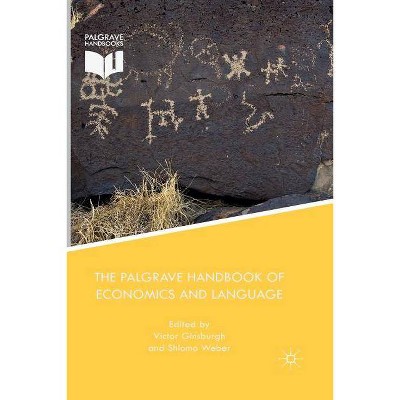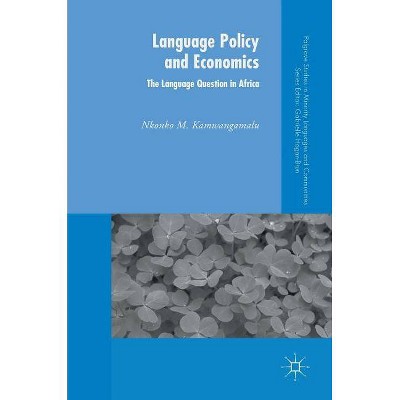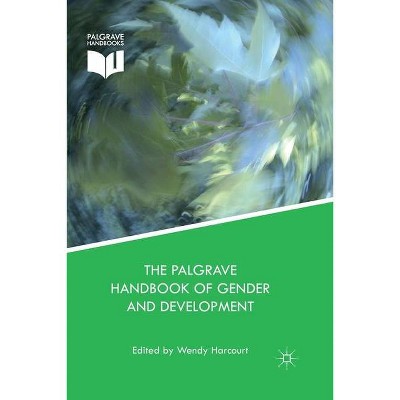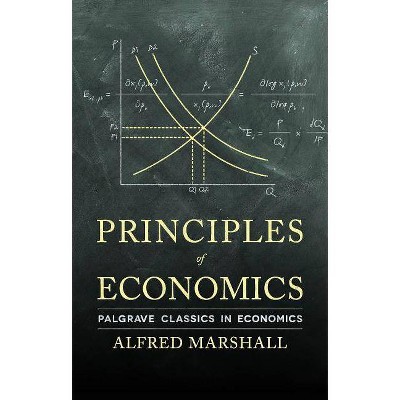The Palgrave Handbook of Economics and Language - by V Ginsburgh & S Weber (Paperback)

Similar Products
Products of same category from the store
AllProduct info
<p/><br></br><p><b> Book Synopsis </b></p></br></br>In this handbook, Victor Ginsburgh and Shlomo Weber bring together methodological, theoretical, and empirical studies in the economics of language in a single framework of linguistic diversity that reflects the history and contemporary study of the topic. The impact of linguistic diversity on economic outcomes and public policies has been studied not only by economists and other social scientists in the contemporary era, but all the way back to the 19th century by geographer and naturalist, Alexander von Humboldt, who emphasized the importance of language in the framework of cultural experience. This interdependence of language and culture is reflected in the chapters in this handbook, which have been written by leading economists, linguists, and political scientists from universities in the United States, Australia, Russia, Israel, the United Kingdom, France, Spain, Belgium, Germany, Switzerland, Denmark, Finland, Hungary, and the Czech Republic. The contributions are divided into four parts. Part I examines linguistic concepts that forge common ground between economists, political scientists, sociologists, and linguists, and introduces the notion of linguistic proximity extensively utilized in various chapters of the volume. Part II assesses the impact of languages on market interactions, including international trade, patent protection, migration, and use of languages in ancient and modern business environments. Part III focuses on the link between linguistic policies and economic development, including the analysis of regional development in Asia, Africa, Europe and Russia. Part IV addresses issues of globalization, minority languages, and the protection of linguistic rights in multilingual societies.<p/><br></br><p><b> From the Back Cover </b></p></br></br>In this handbook Victor Ginsburgh and Shlomo Weber bring together methodological, theoretical, and empirical studies in the economics of language in a single framework of linguistic diversity that reflects the history and contemporary study of the topic. The impact of linguistic diversity on economic outcomes and public policies has been studied not only by economists and other social scientists in the contemporary era, but all the way back to the 19th century by geographer and naturalist, Alexander von Humboldt, who emphasized the importance of language in the framework of cultural experience. <p/>This interdependence of language and culture is reflected through the chapters in this handbook which have been written by leading economists, linguists and political scientists from universities in the United States, Australia, Russia, Israel, the United Kingdom, France, Spain, Belgium, Germany, Switzerland, Denmark, Finland, Hungary, and the Czech Republic. The contributions are divided into four parts. Part I examines linguistic concepts that forge common ground between economists, political scientists, sociologists and linguists, and introduces the notion of linguistic proximity extensively utilized in various chapters of the volume. Part II assesses the impact of languages on market interactions, including international trade, patent protection, migration, and use of languages in ancient and modern business environments. Part III focuses on the link between linguistic policies and economic development, including the analysis of regional development in Asia, Africa, Europe and Russia. Part IV addresses issues of globalization, minority languages and the protection of linguistic rights in multilingual societies.<br><p/><br></br><p><b> Review Quotes </b></p></br></br><br>"This volume is clearly an important contribution to the literature on the economics of language. It is comprehensive: the topics cover the full range of issues that we would want to see addressed. ... While few will want to read it from cover to cover, those with even a passing interest in the nexus of language and economics, regardless of their own discipline, will find individual chapters invaluable." (Barry R. Chiswick, Journal of Economic Literature, Vol. 54 (3), September, 2016)<p></p><br><p/><br></br><p><b> About the Author </b></p></br></br>Victor Ginsburgh is Honorary Professor of Economics at the University of Brussels, Belgium. He is an author and editor of numerous books and has published papers in the <em>American Economic Review</em>, <em>Econometrica</em>, <em>Journal of Political Economy</em>, <em>Journal of Economic Perspectives</em>, <em>Journal of Economic Theory</em>, <em>Games and Economic Behavior</em> and other leading journals. His most recent publications include the <em>Handbook of the Economics of Art and Culture</em> (2006 and 2013, co-edited with David Throsby) and <em>How Many Languages Do We Need?</em> (2011, with Shlomo Weber). <p/>Shlomo Weber is Robert H. and Nancy Dedman Trustee Professor of Economics at Southern Methodist University, Dallas, Texas, USA, and Academic Head at the Center for the Study of Diversity and Social Interactions, New Economic School, Moscow, Russia. His areas of expertise are game theory, public and political economics. He received various prizes, including the Alexander von Humboldt Research Prize for outstanding foreign scientists and the Megagrant Prize from the Russian Ministry of Science and Education. He recently published <em>The Oxford Handbook of the Russian Economy</em> (2013 in English, and 2014 in Russian, co-edited with Michael Alexeev).<br>
Price History
Price Archive shows prices from various stores, lets you see history and find the cheapest. There is no actual sale on the website. For all support, inquiry and suggestion messages communication@pricearchive.us


















